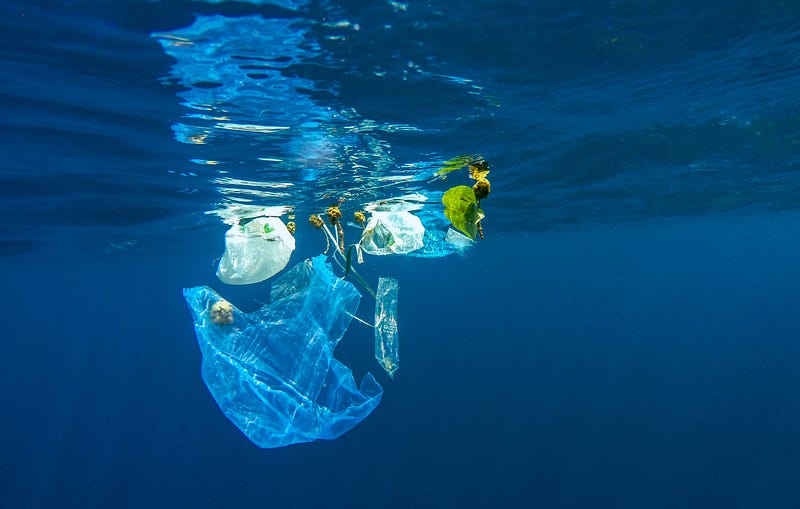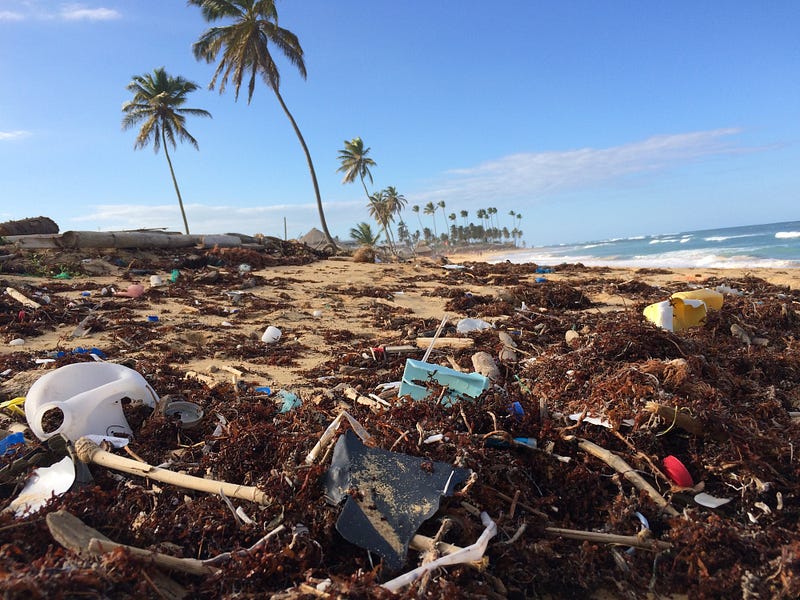Rethinking Our Approach to Ocean Plastic: Bigger Issues Await
Written on
The Rising Tide of Ocean Challenges
The ocean is increasingly facing severe challenges, including rising temperatures, acidification, and elevated sea levels. Should we concentrate our efforts on these pressing matters instead of focusing on plastic straws, or does any emphasis on ocean issues help raise broader awareness?

Photo: Ahmed Areef/EyeEm/Getty Images
By Adele Peters
Seattle made headlines last summer as the first major U.S. city to prohibit plastic straws, part of a larger anti-plastic movement that gained momentum. Following suit, Alaska Airlines declared its intention to eliminate plastic straws in May, with other companies like Bon Appétit, American Airlines, and Starbucks also making similar commitments. This shift reflects a growing public consciousness regarding ocean plastic pollution, prompting many businesses to promote alternative packaging solutions and the increasing popularity of reusable water bottles.
A recent study published in the journal Marine Policy questions whether the current emphasis on plastic pollution may be diverting attention from more significant threats to the ocean. The authors suggest that the focus on changing consumer products, like bottles or straws, might distract us from addressing deeper economic transformations that are necessary. As greenhouse gases continue to accumulate in the atmosphere, nearly all excess heat ends up in the oceans, resulting in the death of fish and coral reefs. This warming also contributes to rising sea levels and the melting of polar ice caps, intensifying the frequency and severity of hurricanes. Increased carbon dioxide levels lead to ocean acidification, jeopardizing marine life, while large-scale commercial fishing practices severely deplete fish populations.
Marine scientist Richard Stafford from Bournemouth University argues that plastic pollution may not represent as critical a threat to marine ecosystems as climate change or overfishing. He perceives the corporate emphasis on plastic as a form of "greenwashing," where companies appear more sustainable by banning plastic straws, despite not making significant strides toward reducing emissions from jet fuel. Similarly, consumers who opt for reusable water bottles might mistakenly view themselves as environmentally conscious while taking long-haul flights across the globe. Stafford asserts, "Addressing simple, consumer-driven solutions won't fundamentally alter the economic realities that need to be transformed to tackle the larger issues."

Photo: Dustan Woodhouse/Unsplash
The conversation need not be an either-or scenario: increased attention to ocean plastic doesn't necessarily mean reduced focus on climate change or the need for broader societal reforms. Starbucks, for example, has already transitioned to renewable energy for its U.S. and Canadian stores, making packaging—a visible aspect of its environmental impact—a logical area for improvement. The production of plastic consumes roughly 6% of global oil (similar to the aviation sector) and contributes to greenhouse gas emissions; projections suggest it could account for 15% of the total global carbon budget by 2050. Transitioning from single-use plastics to circular economy models, which involve systems of reusable packaging for products like food or deodorants, could significantly lower emissions.
While Stafford points out that people often focus on a single environmental issue at the expense of others, George Leonard, chief scientist at the nonprofit Ocean Conservancy, argues that rising awareness about plastic pollution has expanded the conversation to include other ocean-related challenges. He notes, "Plastic has introduced the overall health of the ocean to a much wider audience," highlighting that many people do not live near the ocean and rarely experience it firsthand. The global dialogue surrounding plastic has indeed heightened awareness among both the public and policymakers.
The nonprofit tackles various significant threats to ocean health, including overfishing and climate change, emphasizing that their focus on plastic does not undermine their efforts on these other issues. "We can address multiple concerns simultaneously," Leonard states. Evidence regarding the severity of plastic pollution continues to mount. While the health effects of microplastics found in marine life, bottled water, and beverages are still being studied, ongoing research is crucial. The interactions between different environmental factors can have compounding effects; for instance, climate change may exacerbate diseases in coral reefs, and a significant study from 2018 indicated that corals exposed to plastic waste were more prone to illness.
In theory, governments can address multiple significant environmental challenges at once, and advocates can push for comprehensive reforms. However, given the multitude of urgent threats facing our environment, should we prioritize? Our response to climate change and the alarming decline in wildlife populations has been sluggish. With limited time to act, is the energy spent on plastic activism better directed toward climate change or biodiversity loss? The complexity of climate issues makes them less visible and seemingly more challenging to tackle compared to the straightforward act of picking up littered bottles on the beach.
Stafford emphasizes the need for fundamental changes, suggesting that solutions should involve reevaluating our consumptive lifestyles rather than merely substituting materials while maintaining existing consumption patterns. In his paper, he asserts, "We must focus on making our way of life more sustainable by questioning our excessive consumer habits, rather than limiting our scope to sustainable consumer choices."
Adele Peters is a staff writer at Fast Company, dedicated to exploring solutions to some of the world's most pressing challenges, including climate change and homelessness. She has previously collaborated with GOOD, BioLite, and the Sustainable Products and Solutions program at UC Berkeley. Follow her on Twitter @adele_peters.
The Impact of Individual Actions
The first video, "A Drop in a Plastic Ocean: How One Person Can Make a Difference," discusses how individual actions can lead to significant changes in combating plastic pollution.
The Broader Debate on Plastic
The second video, "Primary Debates Motion Workshop: Getting Rid of Plastic Pollution in Our Oceans is Just a Dream," explores the complexities of tackling oceanic plastic pollution and its implications.